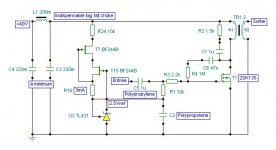BJTs simply made up of many small signal devices in parallel would get fatal problems with hot spots.
This is avoided by internal base and emitter resistors to force sharing, which slows everything down
David,
Is there more info about this on the 'net that you know of?
jan didden
The key words are "emitter ballast"
see Inside the RF Power Transistor
and http://www.google.com.my/url?sa=t&s...sg=AFQjCNE4yy7VfsjNCWlZsOI0_PqTMSuKrg&cad=rja
see Inside the RF Power Transistor
and http://www.google.com.my/url?sa=t&s...sg=AFQjCNE4yy7VfsjNCWlZsOI0_PqTMSuKrg&cad=rja
The key words are "emitter ballast"
see Inside the RF Power Transistor
and http://www.google.com.my/url?sa=t&s...sg=AFQjCNE4yy7VfsjNCWlZsOI0_PqTMSuKrg&cad=rja
Fascinating! I also looked up 'ring-emitter transistors', the principle (i.e. using multiple, ballasted emitters) seems similar as in those RF power types.
jan didden
Jan, I believe that "RETs" was an attempt to apply RF transistor design/manufacturing techniques to LF transistors
Jan,
there´s a inherent trade-off between power handling and bandwidth as power is inversely proportional to the square of frequency. Electron mobility in materials that can withstand large electric fields is slower, but the time limits are decisively set by the necessarily larger capacitances (larger charge storage required for operation).
By the way, why the sudden interest in the subject? I happened to read, by chance really, some of your previous statements de-emphasizing the importance of a wide operating frequency rage. Have you reassessed your stance?
there´s a inherent trade-off between power handling and bandwidth as power is inversely proportional to the square of frequency. Electron mobility in materials that can withstand large electric fields is slower, but the time limits are decisively set by the necessarily larger capacitances (larger charge storage required for operation).
By the way, why the sudden interest in the subject? I happened to read, by chance really, some of your previous statements de-emphasizing the importance of a wide operating frequency rage. Have you reassessed your stance?
Jan,
there´s a inherent trade-off between power handling and bandwidth as power is inversely proportional to the square of frequency. Electron mobility in materials that can withstand large electric fields is slower, but the time limits are decisively set by the necessarily larger capacitances (larger charge storage required for operation).[snip]
Sorry I do not understand this
[snip]By the way, why the sudden interest in the subject? I happened to read, by chance really, some of your previous statements de-emphasizing the importance of a wide operating frequency rage. Have you reassessed your stance?
Simple: I had an event last weekend (ElektorLife!) where I was going to give a presentation about Doug Self's power amp consisting of 64 parallel opamps, as published in Elektor magazine. In the preparation for that I wondered why output devices seem to be necessarily slow.
But as far as I know, I never said operating freq range should not be wide. What makes you think so?
jan didden
Sorry Jan, I`m not able to write long and detailed posts. There are descriptions of how a large number of parameters in a transistor chip interact.
Could you instead tell me something about your Nemesis amp please?
Could you instead tell me something about your Nemesis amp please?
Jan,
I think that power transistors (BJT) are not necessarily slow, but manufacturing processes for fast transistors are expensive, because of necessity of parallelling many small transistors structures, which are faster than big ones, because of smaller capacities and interconnection resistance. This is well known in CPU architecture, where very small transistors can permit to reach very high frequencies (if it is possible to sink large amount of heat in small devices... that's the big problem)
I think that power transistors (BJT) are not necessarily slow, but manufacturing processes for fast transistors are expensive, because of necessity of parallelling many small transistors structures, which are faster than big ones, because of smaller capacities and interconnection resistance. This is well known in CPU architecture, where very small transistors can permit to reach very high frequencies (if it is possible to sink large amount of heat in small devices... that's the big problem)
Sorry Jan, I`m not able to write long and detailed posts. [snip]
Great! I hate very long and winding posts; these are better saved for an article.😉
[snip]Could you instead tell me something about your Nemesis amp please?
There's some info on my private website Jan Didden audio diy and other human frailties place . The "Arch Nemesis", Nelson Pass' variation/improvement on the original Nemesis (by Jean Hiraga, described in L'Audiophile), is described in my bookzine Linear Audio Volume 0 available from linearaudio.net.
jan didden
My take on the Nemesis
Well, maybe you should start a thread about it if you want to discuss it?
jan didden
post50 shows a cascoded CCS using BF244b.
The lower jFET cannot operate well, as a CCS, when the voltage from the cascode does not suit.
Change t15 to a more suitable device. A low pinch off voltage device would be better.
Read Walt Jung.
The lower jFET cannot operate well, as a CCS, when the voltage from the cascode does not suit.
Change t15 to a more suitable device. A low pinch off voltage device would be better.
Read Walt Jung.
Jan,
well, there`s not much to discuss really, it´s the same thing, Hiraga`s designs can only be altered to the worse.
well, there`s not much to discuss really, it´s the same thing, Hiraga`s designs can only be altered to the worse.
I made a new thread which is related, some of you might be interested.
http://www.diyaudio.com/forums/solid-state/177906-speed-bjts-fairchild-vs-nxp-bc550.html
- keantoken
http://www.diyaudio.com/forums/solid-state/177906-speed-bjts-fairchild-vs-nxp-bc550.html
- keantoken
Higher voltage handling is slowerJan,
there´s a inherent trade-off between power handling and bandwidth as power is inversely proportional to the square of frequency. Electron mobility in materials that can withstand large electric fields is slower, but the time limits are decisively set by the necessarily larger capacitances (larger charge storage required for operation).
- Status
- Not open for further replies.
- Home
- Amplifiers
- Solid State
- Why are Power Transistors so slow?
